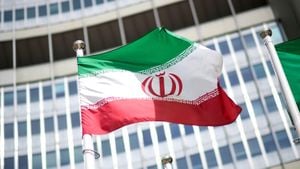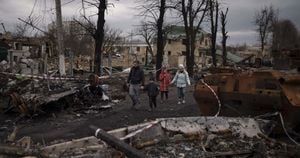Yehuda Bauer, celebrated Holocaust historian and staunch advocate for remembrance and education, passed away on October 18, 2024, at his home in Jerusalem at the age of 98. His daughter Anat confirmed the news of his death, marking the end of a remarkable life dedicated to scholarship and the fight against antisemitism.
Bauer's life began well before he became known as one of the foremost voices on the Holocaust. Born on June 29, 1925, he fled Nazi-occupied Europe with his family, escaping to Mandatory Palestine from Czechoslovakia just before the outbreak of World War II. This traumatic background heavily influenced his work. Initially focused on contemporary Israeli history, Bauer found his path redirected by conversations with key figures, particularly Abba Kovner, a partisan who fought against the Nazis.
His pivotal moment came after the publication of Raul Hilberg's seminal book, The Destruction of the European Jews, which laid bare the systematic nature of the Holocaust. While Hilberg's work is often considered the cornerstone of Holocaust studies, Bauer contended it framed the narrative too narrowly. "What Bauer did was to puncture the myth of Jewish passivity during the Holocaust," said Menachem Rosensaft, who teaches about genocide at Cornell Law School. He believed, as did many survivors he spoke with, including Kovner, who actively resisted the Nazis, it was imperative to explore and acknowledge the active forms of Jewish resistance during the Holocaust.
Bauer’s extensive research and contributions pushed the boundaries of Holocaust studies. He argued against the stereotype of Jews solely as victims, emphasizing their resistance and survival instinct. This was no small battle; for many years, scholars shied away from addressing the Holocaust comprehensively, hindered by various political and academic pressures.
His work extended well beyond mere academic exercise—Bauer was deeply engaged with the moral dimensions of historical scholarship. He consistently drew connections between the Holocaust and contemporary issues of racism and denialism. For him, the task was not only to document history but also to cultivate awareness of how history informs the present. His life’s work sought to educate future generations on the importance of combating hatred and ensuring such atrocities would never recur.
Through numerous publications, lectures, and public appearances, Bauer dedicated himself to advocacy for Holocaust education. He believed it was necessary to keep the dialogue alive, raising awareness about antisemitism and other forms of discrimination. Bauer insisted on the moral imperative of remembering the Holocaust, as he viewed forgetting it as equivalent to repeating it. His belief was encapsulated best with his often-quoted adage: “Thou shalt not be a victim, thou shalt not be a perpetrator, but, above all, thou shalt not be a bystander.”
His commitment to education and advocacy was complemented by his work as the academic director of the International Institute for Holocaust Research at Yad Vashem, Israel's official memorial to the victims of the Holocaust. Under his leadership, the institute became recognized globally for its comprehensive historical research and its role as a resource for educators and institutions worldwide.
Despite his focus on historical fact, Bauer infused his writings with palpable empathy, refusing to allow statistical narratives to overshadow the human experience of the Holocaust. He employed narratives of individuals and families to convey the depth of suffering and resilience during this period, creating a rich, relatable historical tableau.
Bauer's scholarship extended beyond academic circles. He was also known for speaking out about present-day injustices. His fierce criticism of antisemitism today underscored his view of history as cyclical; he firmly believed modern anti-Jewish sentiment echoed the past, demanding vigilance and active resistance.
He had his share of contentious moments, too—his outspoken views often put him at odds with more conservative elements within both Jewish and broader academic communities. Critics sometimes mischaracterized him for being too focused on resistance and not sufficiently highlighting the enormity of victimhood. Bauer, undeterred, responded by insisting on the need to balance both perspectives without diminishing the experiences of those who suffered.
Many of those who interacted with him described Bauer as both brilliant and approachable, someone who could articulate complex ideas with clarity and passion. His lectures often drew large audiences, and his ability to engage students, scholars, and the general public alike made him not only a historian but also a beloved educator.
His passing has been felt throughout scholarly and advocacy circles. Numerous statements of remembrance and tribute have emerged, with many emphasizing his role as a mentor and guide to younger generations of historians and educators. His relentless pursuit to illuminate the past ensures his legacy will endure, inspiring future scholars, advocates, and everyday people to remain aware and engaged.
Bauer's life was not just about hope; it was also about confronting difficult truths and challenging oversimplified narratives surrounding the Holocaust and Jewish history. His work goes far beyond the borders of academia; it’s infused with deep social relevance and unyielding moral courage.
Even at 98, Bauer remained active, continuing to speak at events and engage with students and scholars until the final months of his life. His passing signals the loss of not just a historian but also of a voice advocating for humanity, resistance against oppression, and remembrance of history's lessons. He leaves behind not only his family and friends but also countless students and readers who have been inspired by his life’s work.



